The Collector's Daughter Read online
Page 13
“Ladies first.” He turned to Eve and handed her a torch. “You are the most impatient, as well as the smallest.”
She hesitated. What might she find inside? Snakes? Bats? Angry spirits? “Could there be snakes?” she asked out loud.
“No.” He shook his head. “It’s been sealed for three millennia. Nothing will be alive in there.”
He sounded very definite. It was on the tip of Eve’s tongue to suggest that one of the men should lead the way, but then she steeled herself. It was an honor to be the first person to enter for three thousand years. She couldn’t turn that down, especially not as a budding lady archaeologist.
Holding the torch in her teeth, she got down on her knees and crawled through the aperture, standing upright once she was inside. The temperature was hotter than the hottest Turkish bath, but it was a dry, oppressive heat that irritated her throat. The dusty air smelled faintly of perfume and, outside her torch beam, the darkness was impenetrable. Her heart was pounding so hard she thought she might faint and at first she didn’t dare move. Behind her she heard Howard chipping away to widen the hole. One of the men was coming through, so she shuffled sideways, giving a startled yelp when her foot came into contact with an object.
She shone her torch around the chamber. The animal heads she had spotted through the aperture belonged to some strange elongated creatures; one reminded her of a leopard, another of a crocodile. The hairs on the back of her neck stood on end. To her left there was a pile of wheels and the body of a carriage; she guessed this was a vehicle designed to take the tomb’s occupant to the afterlife, as was the Egyptian tradition. On the floor there were wooden chests and containers, footstools and jars, all higgledy-piggledy.
Her father appeared by her side, and she slipped her arm through his and clutched tight as they waited for Howard. Neither spoke. They were breathing air that had not been breathed for three millennia. She felt giddy, exhilarated, and nervous, all at the same time. It made her conscious of her physicality—the beating of her heart, the in-and-out movement of her ribs, the muscles of her eyes as they strained to peer through the darkness.
When Howard got inside, he began picking up objects and examining them by torchlight. “I think the animal-headed figures are couches,” he told them, shining his beam along the length of one. He picked up a jar and turned it over to read the name engraved on the base: the first said Amenhophis, another read Akhenaten, and then he came upon three in a row that said Tutankhamun.
“Why so many names?” he wondered out loud.
Eve stepped carefully toward the right side of the chamber and almost dropped her torch in astonishment when her beam alighted on a life-sized statue of a black-skinned boy wearing a gold headdress and holding a staff. The whites of his eyes gleamed. “Who’s this fellow?” she asked, her voice shaky, and Howard came over.
“Good lord!” he exclaimed. “It looks like a guardian statue.” He shone his torch along the wall it stood against and there, behind a low chest, was another statue that looked identical.
“What’s a guardian statue?” Eve asked. The statue’s gaze was uncannily lifelike. Every detail was perfect, from the pupils right down to the toes inside its golden sandals, as if it could spring to life at any minute and step toward her.
“It means the entry to the burial chamber must be here,” he said. He knocked on the wall behind the statues. It was hollow.
Eve felt scared suddenly. “Perhaps we shouldn’t go any farther,” she whispered. She wrapped Howard’s jacket more tightly around her, hoping they could leave soon. There was something that didn’t feel right about this. Perhaps it was the thought that there could be a mummified corpse inside. It was like digging up someone’s grave.
“We can’t stop now,” Howard said, and started chipping away at the lower part of the wall between the statues, as if he were a man possessed.
Eve realized that nothing she or Pups could say would stop him. Instead they stood, arms linked, holding their breath as they waited to find out what—or who—might lie beyond.
Chapter Twenty-Two
Valley of the Kings, November 26, 1922
Howard’s pick soon reached the other side of the wall. He enlarged the hole, then patted his pockets, muttering, “Damnit, I forgot to bring a candle. I suppose a match will have to do.” He struck a match and held it through the hole into the next chamber, waiting to see if the flame would be extinguished by gases inside. As he did so, a strange smell reached Eve: something oily and musky with a harshness that caught the back of her throat. She couldn’t think of anything to compare it to: perhaps a mixture of Lysol, incense, and a sick horse’s urine.
“Can you smell that?” she asked.
“It’s extraordinary how the ancient oils retain their scent,” Howard said. “The air seems safe in there. Do you want to be the first to go in again, little Eve?”
Goose bumps pricked her arms. She had strong misgivings, but she’d done it once and that had worked out alright. Steeling herself, she got down on her hands and knees and crawled through. The scent grew stronger, making her cough and choke, and causing her eyes to water.
Immediately when she reached the other side, even before she stood up, her torch beam illuminated a wall of brilliant gold carvings straight in front of her. It was as tall as the chamber itself and there was a narrow corridor running around either side.
She shuffled to the left as her father came through, then Howard. “By Jove, we’ve found it,” he said. “This is a shrine. The coffin will be inside.” He shone his torch at the seals on the side of the shrine facing them. “And look. The ankh. The bird. I’ve got Tutankhamun . . . and it is intact.” His voice cracked, as if he were about to weep.
Eve squeezed his arm in congratulations. “You found it, Howard. This will make your name. You’ll be famous!” She was glad the coffin was sealed inside the shrine and she didn’t have to look at it. It felt creepy to think that a long-dead king’s mummy lay in there.
Howard gave a low laugh. “Theodore Davis came within six feet of this very spot. He would have been devastated to hear of our discovery! Just as well he passed away.”
Eve shone her torch to the left and it lit an elaborate wall painting. “Look.” She gestured and both men turned but it was impossible to make out the subject because the torch beam illuminated only a small area at a time.
“Careful where you put your feet,” Howard said, and Eve realized there were several small items on the ground. She slid her feet as she moved rather than lifting them so she didn’t risk breaking anything.
Over on the other side of the shrine there was a stack of golden oars. The perfume was still catching her throat and, combined with the stale air, the heat, and the stuffiness, it made her dizzy. She rested a hand against the shrine to catch her balance. Pups was coughing.
Behind the shrine she could see a doorway into another chamber. A figure she recognized as Anubis, the jackal-headed god who watched over the dead, was reclining on a plinth.
Howard picked something up from the ground and examined it. “I can’t see any harm in taking a few mementos so long as we are discreet. What do you reckon, Lord C?”
Pups agreed. “Only small pieces. We’ll have to keep them for ourselves and not try to sell them on the open market, mind.”
Eve was worried. It wasn’t cheating the Egyptian government that bothered her, because they need never know. The thought in her head was that they shouldn’t steal from Tutankhamun. Egyptians designed their tombs to contain everything the occupant would need in the afterlife, and it seemed wrong to take anything, like stealing flowers from a grave.
Howard slipped a couple of items into the pockets of the jacket she was wearing, and she saw Pups bending to retrieve more. Eve ran her fingers over the delicate gold filigree of the shrine. It felt like a holy place, with the incense smell and the absolute quiet.
“We’d better go soon,” Howard said, consulting his pocket watch. “We need to get back well before firs
t light.”
He crawled out of the burial chamber first, followed by her father. Eve had a moment of panic when she was alone inside once more. What if there was a rock fall that trapped her there with Tutankhamun’s mummy? She would die of terror long before she succumbed to suffocation.
As she knelt to crawl out, her fingers closed around an item on the floor. It looked glittery by torchlight. Should she take just one memento? Overcoming her reservations, she picked it up and stuffed it in her skirt pocket, then clambered through and stood up on the other side.
Eve and Pups watched as Howard rearranged chunks of plaster across the hole in the doorway to the burial chamber, then propped a basket and a bunch of reeds in front. “That will have to do,” he said, checking his handiwork.
“If it looks like a recent break-in, all the better for our case to keep some of the finds,” Pups said.
On the way through the antechamber Eve tripped over an object and it tumbled sideways with a deafening clatter, but she couldn’t see clearly enough to set it right. She was in a hurry to get back out into the night air.
Howard took some time patching the hole in the outer doorway with dampened clay, and smoothing it down. He couldn’t restore the broken seal but he made the surface around it look as authentic as he could, then locked the metal gate.
Eve took deep breaths, trying to clear her lungs of the stuffy, perfumed air from inside the tomb. Jackals were still howling in the hills behind and Eve thought it sounded as if they were in pain. It reminded her of the noise her father’s dog Susie once made when a housemaid stood on her paw.
When they got back to Howard’s house, he fetched a bottle of brandy and three glasses, pouring them each a generous measure. Eve felt the warmth seep into her bones, its fruity scent cutting through the stale muskiness of the tomb that still lingered in her nostrils.
After a long swig, Pups started chuckling, then Howard joined him. It was infectious. Eve felt light-headed and almost hysterical as she laughed out loud. They had shared the most magnificent secret.
“Let’s see what you’ve got then,” Howard said, and Eve emptied the jacket pockets onto his table.
“That’s a shabti,” he said, looking at a small, human-shaped statue. “Do you know about them? They represent the workers that the king would need to perform tasks for him in the afterlife.”
“I saw dozens of these, so he will be very well served,” Eve remarked.
Howard picked up a long cylindrical object. “This was for holding reed pens,” he said. “And my goodness, that’s a wishing cup. A very fine example.”
The item Eve had picked up at the last moment was a heavy gold box with a lotus-flower cartouche carved on the lid, and it smelled strongly of the unpleasant musky scent of the tomb. Howard pried off the lid with a metal ruler and showed her there was a sticky substance inside. The scent was overpowering now, making her eyes water.
“It’s an unguent container,” he said. “And the contents are still viscid. The tomb robbers would have taken this if they’d seen it. Unguents were more valuable than gold to the Ancient Egyptians.”
“It looks rather valuable,” Eve said. “It’s heavy, so I’m guessing it’s solid gold. Typical me! I always veer toward the most expensive items when I’m shopping, and now I’ve done the same thing in the tomb. Perhaps I should return it.”
“Nonsense,” Howard said, pushing it toward her. “It’s yours now. Are you sure that’s all you want?”
Her father had a wooden goose, an intricate collar made of beaten gold, and an elegant wine jar. Howard had a range of objects because he’d pocketed several from the antechamber too. The table was covered in them.
“Just this is fine,” Eve said, closing the box and putting it back in her skirt pocket.
She couldn’t believe how well preserved and intricately decorated everything was. Tutankhamun had clearly been a king with infinite wealth at his disposal.
“I hope you understand that we can’t breathe a word about our adventure,” Howard told them. “Not to anyone. It would undermine our legitimate claim and make it difficult to get another concession in Egypt.”
They both agreed that they wouldn’t tell a soul.
“I’m glad Theodore Davis didn’t find the tomb,” he said. “We will treat it with more care and respect than he would have done. I plan to keep the most meticulous records in the history of archaeology.”
Eve noticed the sky was lightening outside. “Pups, we should go back to the hotel and get some rest.”
“I don’t think I’ll be able to sleep tonight so I’ll come across with you,” Howard said. “I need to send telegrams informing the authorities that we’ve made a find that looks significant, and requesting their presence so we can proceed.”
Eve took off his jacket and hung it on a coat stand in the hall, and Howard opened the front door.
“Bulldog is rather quiet this morning,” Eve said, peering through the misty dawn toward the canary’s cage. “Perhaps he decided to sleep late.”
Howard followed her out and looked into the cage. “Oh no! Poor Bulldog!” he cried. “A cobra’s got him.”
The tail of a gray-brown snake was hanging through the bars, and the rest of it was coiled in the cage, with a canary-sized bump under its skin, about a third of the way down. Bulldog was slowly being digested.
Chapter Twenty-Three
London, January 1973
Eve woke with a start the morning after Ana Mansour’s visit. She vaguely recalled she had been dreaming about the tomb but the details were foggy. Only one thing was clear: she had to give back the gold unguent container. She should never have taken it. Perhaps Ana could help her to do it anonymously, so she wouldn’t need to reveal the illicit nighttime visit. Then it could be reunited with the other Tutankhamun treasures in the Cairo Museum, where it belonged.
She remembered the artifacts spread across Howard’s table and wondered how much he had taken from the tomb over the years he worked on it. She didn’t believe Ana’s theory that he had already been inside when she and Pups arrived in November 1922. His astonishment at the sights that night was genuine, and besides, he’d had to chip through sealed doorways. However, it was possible he returned the day before the official opening, while she and Pups were resting at the Winter Palace. And after that, he was often alone inside the tomb, making his intricate drawings of the layout and then cataloguing everything. She didn’t blame him for the items that found their way into his pockets. It was his discovery more than anyone else’s, the crowning achievement of his career, and it was only natural that he wanted some mementos.
Had the Egyptian authorities stuck to the terms of the concession, he could have taken them legitimately, but in 1924 he fell out with them and was temporarily barred from the tomb. During his absence, one of their inspectors found a wooden head of Tutankhamun emerging from a lotus flower that had been packed for shipment without being itemized or catalogued. They accused Howard of attempting to steal it, but he maintained it was an administrative error. Maybe it was, maybe it wasn’t. She clearly remembered seeing some Tutankhamun trinkets when she visited him at his London flat, the one around the corner from the Albert Hall. There was a blue shabti on his desk, and a tiny Anubis figure on the mantelpiece, but nothing that looked as valuable as her gold container.
Once Howard was finally allowed to continue his work on the tomb in 1925, the terms of the concession had been changed, so all the contents belonged to the Egyptian state. Looking back from the 1970s, Eve could see that was only fair. It was part of their national heritage. Returning the gold unguent container would be her way of righting a wrong. That’s what she should do, as long as she didn’t get into trouble for taking it in the first place.
As soon as Brograve awoke, she told him her idea that they ask Ana to return it anonymously. He rubbed his eyes.
“I’m not sure that’s a good idea,” he said. “No matter how discreet Ana is, questions will be asked about how you came to have
it. And remember, we don’t know her very well.” He stretched. “Besides, I haven’t seen it for years.”
That made her pause for thought. When had she last seen it?
When she and Pups returned from Egypt, she’d put it in a hat box in her closet at their Berkeley Square house. After a while she’d moved it to another closet because the unpleasant scent seemed to be impregnating her clothes. When she married Brograve she took it with her to their first home together, at 26 Charles Street, Mayfair, but she never put it on display. It was kept in a drawer in the spare room, as far as she remembered, wrapped in layers of cloth to try and contain the scent. And then, when they moved to Framfield, she’d stuck it in a box in the attic along with some other knickknacks. After that her mind went blank. She had a strange feeling she had put it somewhere in particular—but where?
She had never admitted to Brograve that she couldn’t remember them leaving Framfield. She wished they hadn’t; that house and garden had meant more to her even than Highclere and she missed them terribly. She hoped the new owners cherished them as much as she had.
* * *
Brograve brought her breakfast on a tray and helped her to sit up in bed and balance it on her knees. Since she had come home from Pine Trees, he had brought her breakfast in bed every morning. He would surprise her; she never knew whether it would be porridge, toast and honey, or an egg, but there was always a cup of milky tea. Today it was a boiled egg with toast soldiers arranged around it like the rays of the sun in a child’s drawing.
While she ate, he sat on the bed beside her with his own tea.
“I need to find the unguent container today,” she told him. “If I don’t, they’ll say Howard took it, and once I’m gone, there will be no one left to defend him.”
“The doctor said you were to take it easy,” Brograve warned. “It doesn’t have to be today.”

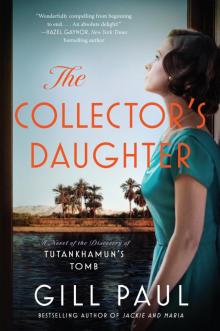 The Collector's Daughter
The Collector's Daughter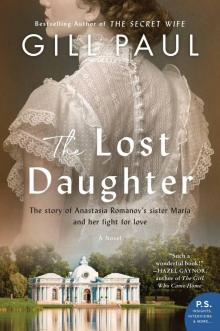 The Lost Daughter
The Lost Daughter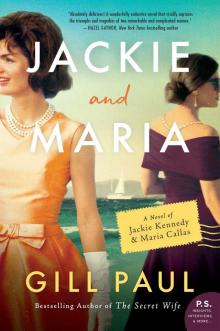 Jackie and Maria
Jackie and Maria The Affair
The Affair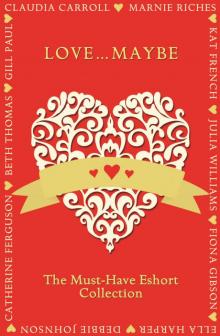 Love...Maybe
Love...Maybe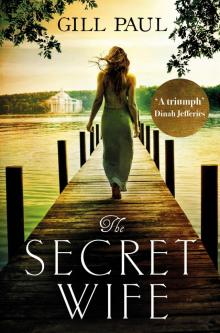 The Secret Wife
The Secret Wife No Place For a Lady
No Place For a Lady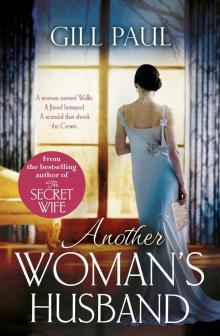 Another Woman’s Husband
Another Woman’s Husband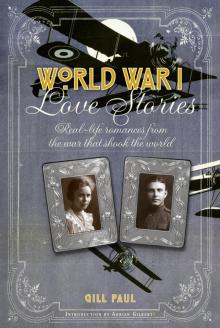 World War I Love Stories
World War I Love Stories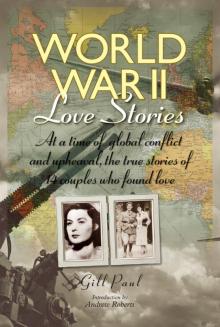 World War II Love Stories
World War II Love Stories